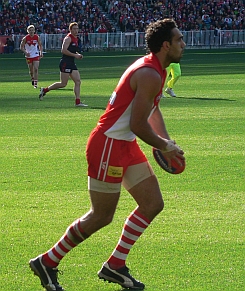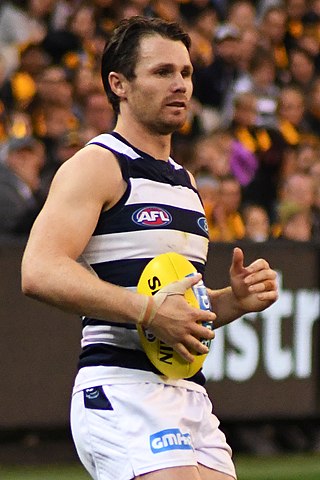Related Research Articles

The Charles Brownlow Trophy, better known as the Brownlow Medal, is awarded to the "best and fairest" player in the Australian Football League (AFL) during the home-and-away season, as determined by votes cast by the three officiating field umpires after each game. It is the most prestigious award for individual players in the AFL. It is also widely acknowledged as the highest individual honour in the sport of Australian rules football.

Edward Goderich "Carji" Greeves, Junior was an Australian rules footballer who played for the Geelong Football Club in the Victorian Football League (VFL), now known as the Australian Football League (AFL). He won the inaugural Brownlow Medal in 1924, awarded to the VFL/AFL player adjudged fairest and best during the home and away season. He is the son of Ted Greeves, who also played with the Geelong Football Club.
The Carji Greeves Medal is a name given in recent decades to an Australian rules football award given to the player(s) adjudged best and fairest for the Geelong Football Club for the season.

The 2006 Brownlow Medal was the 79th year the award was presented to the player adjudged the fairest and best player during the Australian Football League (AFL) home and away season. Adam Goodes of the Sydney Swans won the medal by polling twenty-six votes during the 2006 AFL season. It was Goodes' second Brownlow Medal win, after his victory in 2003.

The 2007 Brownlow Medal was the 80th year the award was presented to the player adjudged the fairest and best player during the Australian Football League (AFL) home and away season. Jimmy Bartel of the Geelong Football Club won the medal by polling twenty-nine votes during the 2007 AFL season.

Patrick Dangerfield is an Australian rules footballer playing for the Geelong Football Club in the Australian Football League (AFL). He previously played for the Adelaide Football Club from 2008 to 2015.
The 2009 Brownlow Medal was the 82nd year the award was presented to the player adjudged the fairest and best player during the Australian Football League (AFL) home and away season. Gary Ablett of the Geelong Football Club won the medal by polling thirty votes during the 2009 AFL season.

The 2005 Brownlow Medal was the 78th year the award was presented to the player adjudged the fairest and best player during the Australian Football League (AFL) home and away season. Ben Cousins of the West Coast Eagles won the medal by polling twenty votes during the 2005 AFL season. It was Cousins' first Brownlow Medal win, and with Daniel Kerr finishing the runner up, it was the first time in 79 years that the top two votegetters were from the same club.
The 2004 Brownlow Medal was the 77th year the award was presented to the player adjudged the fairest and best player during the Australian Football League (AFL) home-and-away season. Chris Judd of the West Coast Eagles won the medal by polling thirty votes during the 2004 AFL season.
The 2003 Brownlow Medal was the 76th year the award was presented to the player adjudged the fairest and best player during the Australian Football League (AFL) home-and-away season. Nathan Buckley of the Collingwood Football Club, Adam Goodes of the Sydney Swans, and Mark Ricciuto of the Adelaide Football Club all won the medal by polling twenty-two votes each during the 2003 AFL season.

The 2011 Brownlow Medal was the 84th year the award was presented to the player adjudged the fairest and best player during the Australian Football League (AFL) home and away season. Dane Swan of the Collingwood Football Club won the medal by polling thirty-four votes during the 2011 AFL season.
The 1977 Brownlow Medal was the 50th year the award was presented to the player adjudged the fairest and best player during the Victorian Football League (VFL) home and away season. Graham Teasdale of the South Melbourne Football Club won the medal by polling fifty-nine votes during the 1977 VFL season. The count was the second of two occasions in which the two field umpires independently voted for the best players on the ground under the 3-2-1 system. This meant that the winner of the Brownlow had a higher number of votes than usual, and Teasdale's fifty-nine votes set and holds the record for the most votes ever polled in a single season. From 1978 onwards, the field umpires conferred after each game and awarded a single set of votes, rather than voting independently.
The 2000 Brownlow Medal was the 73rd year the award was presented to the player adjudged the fairest and best player during the Australian Football League (AFL) home-and-away season. Shane Woewodin of the Melbourne Football Club won the medal by polling twenty-four votes during the 2000 AFL season.
The 2014 Brownlow Medal was the 87th year the award was presented to the player adjudged the fairest and best player during the Australian Football League (AFL) home and away season. Matt Priddis of the West Coast Eagles won the medal by polling twenty-six votes during the 2014 AFL season. Defending Brownlow Medallist Gary Ablett of the Gold Coast Football Club was the short-priced favourite for the medal until he suffered a season-ending shoulder injury in round 16. Betting on the medal was suspended while the extent of the injury to Ablett was determined. Geelong captain Joel Selwood, Collingwood captain Scott Pendlebury and Sydney's Josh Kennedy were considered to be among the new favourites in the wake of Ablett's injury, but at the end of the season Ablett was still second favourite to have polled enough votes before his injury to win the award. He ended up polling the equal-third most votes, tying with Sydney's Lance Franklin on 22 votes.
The 1989 Brownlow Medal was the 62nd year the award was presented to the player adjudged the fairest and best player during the Victorian Football League (VFL) home and away season. Paul Couch of the Geelong Football Club won the medal by polling 22 votes during the 1989 VFL season.

The 2015 Brownlow Medal was the 88th year the award was presented to the player adjudged the fairest and best player during the Australian Football League (AFL) home and away season. Nat Fyfe of the Fremantle Football Club won the medal by polling thirty-one votes during the 2015 AFL season. He became the first Fremantle player to win the Brownlow Medal.
The 1976 Brownlow Medal was the 49th year the award was presented to the player adjudged the fairest and best player during the Victorian Football League (VFL) home and away season. Graham Moss of the Essendon Football Club won the medal by polling forty-eight votes during the 1976 VFL season. The count was the first of two occasions in which the two field umpires independently voted for the best players on the ground under the 3-2-1 system. This meant that the winner of the Brownlow had a higher number of votes than usual. From 1978 onwards, the field umpires conferred after each game and awarded a single set of votes, rather than voting independently.
The 1951 Brownlow Medal was the 24th year the award was presented to the player adjudged the fairest and best player during the Victorian Football League (VFL) home and away season. Bernie Smith of the Geelong Football Club won the medal by polling twenty-three votes during the 1951 VFL season.
The 1962 Brownlow Medal was the 35th year the award was presented to the player adjudged the fairest and best player during the Victorian Football League (VFL) home and away season. Alistair Lord of the Geelong Football Club won the medal by polling twenty-eight votes during the 1962 VFL season.
References
- ↑ "Best and Fairest Player: Greeves (Geelong) wins medal". The Argus. 18 September 1924. p. 18. Retrieved 25 December 2009.
- 1 2 Lovett, Michael, ed. (2009). AFL Record Season Guide 2009. Docklands, Victoria: Slattery Media Group. p. 496. ISBN 978-0-9805162-6-5.
- ↑ "Brownlow Medal". The Age. Melbourne, VIC. 24 April 1924. p. 9.
- 1 2 "1924 Brownlow Medal". AFL Tables. Retrieved 20 September 2009.
- ↑ Lovett, p. 502
- ↑ "Edward Greeves – Statistics". AFL Tables. Retrieved 20 September 2009.
- ↑ "Brownlow Medal – Averages". AFL Tables. Retrieved 20 September 2009.
- ↑ "1924 Brownlow Medal – Team Totals". AFL Tables. Retrieved 20 September 2009.
- ↑ "1924 Season Scores – Ladder". AFL Tables. Archived from the original on 3 October 2009. Retrieved 20 September 2009.
- ↑ Lovett, p. 503